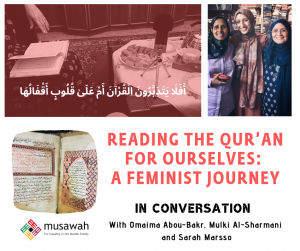It is late in the evening after iftar, and Sarah Marsso, Musawah’s Knowledge Building Coordinator, is sitting in Dr Omaima Abou-Bakr’s living room in Cairo, Egypt. They are joined by another Islamic feminist scholar, Dr. Mulki Al-Sharmani. One window is open to let the breeze in, and the sounds of children playing in the streets outside can be heard floating in.
This Musawah podcast is a modest initiative about the different layers of meaning and evolving relationships with the Qur’anic text.
The recording is informal. You can hear different levels of sound and background noise. We believe that these small imperfections convey a fair picture of any feminist enterprise—it’s real, sincere and part of deconstructing the norms and boundaries. We hope you will enjoy the podcast, share it and give us your feedback!
Released: 31 May 2019
Recorded: 19 May 2019 in Cairo, Egypt.
Music:
- Introduction and end: Oud Dance by Doug Maxwell, Royalty Free Music
- ‘Arafto al hawa by Oum Kalthoum, based on Rabi’a al-Adawiyya’s poem on divine love.
Prepared by: Sarah Marsso
Voices reading the Qur’an and English translation
[audio 5:09] Omaima Abou-Bakr (Surah 55, verses 1-13): The Most Gracious (Allah)! Who has taught the Qur’an. Who has created human. Who has taught him/her speech. The sun and the moon follow courses (exactly) computed; And the herbs and the trees – both (alike) bow in adoration. And the Firmament has He raised high, and He has set up the Balance (of Justice), in order that ye may not transgress (due) balance. So establish weight with justice and fall not short in the balance. Who has spread out the earth for the creatures: Therein is fruit and date-palms, producing spathes (enclosing dates); Also corn, with (its) leaves and stalk for fodder, and sweet-smelling plants. Then which of the favours of your Lord will ye deny?
[audio 10:58] Sarah Marsso (Surah 19, verses 16-21): Relate in the Book (the story of) Mary, when she withdrew from her family to a place in the East. She placed a screen (to screen herself) from them; then We sent her our angel, and he appeared before her as a man in all respects. She said: “I seek refuge from thee to (Allah) Most Gracious: (come not near) if thou dost fear Allah.” He said: “Nay, I am only a messenger from thy Lord, (to announce) to thee the gift of a holy son. She said: “How shall I have a son, seeing that no man has touched me?” He said: “So (it will be): Thy Lord saith, ‘that is easy for Me: and (We wish) to appoint him as a Sign unto people and a Mercy from Us’: It is a matter (so) decreed.”
[audio 22:28] Mulki Al-Sharmani (Surah 2, verse 286): Allah does not charge a soul except [with that within] its capacity. It will have [the consequence of] what it has gained, and it will bear [the consequence of] what it has earned. “Our Lord, do not impose blame upon us if we have forgotten or erred. Our Lord, and lay not upon us a burden like that which You laid upon those before us. Our Lord, and burden us not with that which we have no ability to bear. And pardon us; and forgive us; and have mercy upon us. You are our protector, so give us victory over the disbelieving people.”
With:
Dr. Omaima Abou-Bakr, a professor of English and comparative literature at Cairo University, Egypt; a founding member of “The Women and Memory Forum”; and a member of the Musawah Knowledge Building team. She specializes in medieval Sufi poetry and comparative topics in medieval English and Arabic literature. Her scholarly interests also include women’s mysticism and female spirituality in Christianity and Islam, feminist theology, Muslim women’s history, and gender issues in Islamic discourse.
Dr. Mulki Al-Sharmani, a senior lecturer and an Academy of Finland research fellow at the Faculty of Theology, Study of Religion Unit, University of Helsinki, Finland, and a member of the Musawah Knowledge Building Working Group. She is currently working on two research projects: ‘Islamic Feminism: Tradition, Authority, and Hermeneutics’ and ‘Transnational Muslim Marriages in Finland: Law, Gender, and Wellbeing’. From 2010 to 2011, Mulki was a research fellow at Helsinki Collegium for Advanced Studies, University of Helsinki. From 2005 to 2010, she was a joint research-teaching faculty member at the American University in Cairo.
Sarah Marsso is a graduate of Sciences-Po in European Studies and International Relations and holds an MA in Development and Cooperation in the Middle East & North Africa from l’Institut d’Etudes Politiques of Lyon. Since 2015, she has been coordinating the activities of Musawah’s Knowledge Building Working Group. As part of these activities, she co-authored Musawah’s reports “Women’s Stories, Women’s Lives: Male Authority in Muslim Contexts” (2016) and “Who Provides? Who Cares? Changing Dynamics in Muslim Families” (2018).
Resources:
- Abou-Bakr, Omaima. 2012. ‘Bride of the Qur’an’: An Aesthetic Reading of Surat al-Rahman’. Paper presented at the international workshop “Aesthetics of the Sublime” organized by the Orient Institute-Beirut & Heidelberg University (Cairo, 15-17 December, 2012).
- Abou-Bakr, Omaima. 2010. ‘Articulating Gender: Muslim Women ntellectuals in the Pre-modern Period”. In: Arab Studies Quarterly 32 (3), pp. 127-144.
- Al-Sharmani, Mulki. 2018. ‘Marriage in Islamic Interpretive Tradition: Revisiting the Legal and the Ethical’. In: Journal of Islamic Ethics 2( 1-2), pp.76–96.
- Mir-Hosseini, Ziba, Mulki Al-Sharmani, and Jana Rumminger, eds. 2015. Men in Charge? Rethinking Authority in Muslim Legal Tradition. London: Oneworld.
- wadud, amina. 2006. ‘Qur’an, Gender, and Interpretive Possibilities’. In: amina wadud. Inside the Gender Jihad: Women’s Reform in Islam, pp. 187–216. Oxford: Oneworld.

